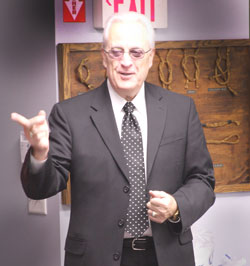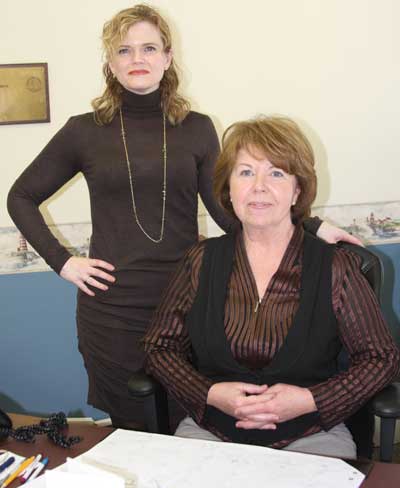NEPPA eNewsletter
March 2011
|
Linda Soucy of Rowley Municipal Lighting Plant has retired after 32 years of service to public power. Soucy began her career at Merrimac Municipal Light Department as a billing clerk in 1978 when she hand wrote the utility bills. "And they were duplicate copies," she added. It was not until 1981 that Merrimac had their first computer. Soucy soon became General Manager Richard Kennedy’s right hand person. She read meters, trained office personnel as well as meter readers and took the minutes of Board meetings. She was the logical replacement when Kennedy retired in 1992. There were not a lot of female managers in 1992 but, according to Soucy, she received an abundance of help and support. "Other managers, the Merrimac staff, associations like NEPPA and engineering consultants were all there to lend a hand and answer questions," she said. "There is no better place to be than in public power when you’re advancing in the utility world." During her tenure as manager of both the water and light departments of the Town of Merrimac, Soucy oversaw many changes including a large system upgrade. Under her direction, the department was involved in community activities that helped promote customer awareness of the benefits of public power. In February of 2005, Soucy made the difficult decision to leave Merrimac after 27 years and accept the position of general manager at Rowley Municipal Light Department. "I was apprehensive about taking on something new and leaving people behind after being comfortable in my home town for all those years," she said, "but when Rowley General Manager Carl Benson suggested it would be a good fit, I decided to look into it." Benson had the utility in good working order before his premature death in 2004, and, according to Soucy, the transition was relatively easy. The biggest difference was she did not have to divide herself between the water and electric departments. This gave her more time to get involved with the community and local businesses and establish better lines of communication with her customers. Soucy now plans to spend time with her new "retirement" golden poodle puppy Maggie, help her brother with his plumbing business and volunteer at a local senior center. Soucy feels that the utility is in good hands with the appointment of Kristina Frizzell as the new general manager. Frizzell had been serving as accountant/customer service director at Belmont Municipal Light Department. Frizzell came to Belmont in 1998 as an intern working the town accounting office. After receiving her accounting degree from Bentley College, she divided her time between the town and the light department. She has been active in the Municipal Electric Association of Massachusetts Communications Committee, and she recently received her masters in public administration from Bentley. Frizzell says it has been an easy transition to Rowley thanks to Soucy’s mentoring and the public power community. "There’s a comfort level knowing managers and outside vendors through NEPPA and MEAM," she said. Frizzell lives in Woburn, Mass. with her husband and two young children.
Kristina Frizzell stands ready to take over for Linda Soucy (seated), who retired in February. ##SHARELINKS##
|
|
News from New Hampshire this week regarding the state’s withdrawal from the Regional Greenhouse Gas Initiative (RGGI) program has major implications, both in the northeast and elsewhere around the country. RGGI, for those not familiar with it, is the first cap-and-trade program in the country designed to reduce greenhouse gases by placing a price on carbon dioxide emissions from power plants. Ten northeastern and mid-Atlantic states are presently participating in the program. The NH House of Representatives, which was taken over by Republicans in the fall elections, voted overwhelmingly to repeal the law which authorized state participation in the RGGI program. At this time, the bill now goes to the state Senate, which is also expected to support the repeal in large numbers. Within New Hampshire, job training programs at local community colleges are in jeopardy, as well as educational programs for energy efficiency professionals. Programs like these have received much of the funding generated by the purchase of carbon emission allowances by New Hampshire power companies, which would dry up if the state leaves RGGI. To date, New Hampshire has received about $28 million from allowance sales. Critics of the program in New Hampshire claim that it increases the cost of electricity in the state, which gets passed on to citizens in the form of higher prices for products and services. Nationally, the vote was widely reported as the "first nail in the coffin" of similar state and regional carbon cap-and-trade programs under consideration. Several California newspapers sought to use the New Hampshire action as a rallying point to reverse their own state’s cap-and-trade law known as AB32. In New Jersey, legislation to end the state’s participation in RGGI has been introduced, and a citizens activist group has been successfully lining up co-sponsors.While RGGI has been seen by many as a model for federal cap-and-trade legislation, it has itself fallen victim to the economic downturn, with allowance prices dropping steadily due to reduced electric demand (and therefore reduced carbon emissions) in the northeast. Furthermore, at least three states (New Hampshire, New York and New Jersey) have dipped into their RGGI funds to help balance state budgets, providing ammunition to cap-and-trade critics who argue that the program will eventually be nothing more than a back door taxing scheme on electricity consumers, with no long-term environmental benefits. With federal cap-and-trade legislation "off the table" in the 112th Congress, some of the momentum behind state and regional carbon reduction programs seems to be disappearing, especially as state governments cope with unprecedented fiscal challenges. Time will tell if RGGI, AB32 and similar initiatives can be sustained in the face of growing political opposition and financial challenges. For New Hampshire at least, the answer right now seems to be no. ##SHARELINKS##
|
|
The Shrewsbury Electric and Cable Operations (SELCO) Commission has selected Michael R. Hale to replace retiring General Manager Thomas R. Josie. Josie has served as SELCO’s general manager since 1986 and he announced his retirement in December 2010. ##SHARELINKS##
|
|
The Village of Swanton has announced that Reginald Beliveau, Jr. has accepted the position of village manager. Beliveau will succeed retiring Village Manager George H. Lague who has been with the village since November 1988. Belleveau comes to the village from the IBM Corporation and is a resident of Swanton. He will assume the duties of village manager on March 1, 2011.
##SHARELINKS##
|
|
The Belmont Municipal Light Department (BMLD) hired Sanjin (Sam) Osmancevic as engineer/operations manager. He will be responsible for overseeing the daily operations, maintenance, construction and installation for the safe and reliable operation of the electric sub-transmission and distribution system, as well as assisting with budgeting and planning for the department. ##SHARELINKS##
|
|
More than 100 friends, professional colleagues and local and state officials gathered in late February to celebrate Ted Garille’s retirement as general manager of the Pascoag Utility District. Garille, who served as the chief executive of the electric and water utility for the past 15 years, was praised for his leadership and vision in transforming the utility into a progressive, innovative, organization with a strong focus on customer service and low rates. Tributes were presented from state and local officials, as well as Rhode Island’s two U.S. Senators, Sheldon Whitehouse and Jack Reed. Reed’s comments were presented on video from his Washington office. Garille’s former staff members at Pascoag presented him with a meter lamp commemorating his service to the district, while chairman Al Palmisciano read a citation from the Board of Utility Commissioners. While Garille has officially retired as Pascoag’s general manager, he plans to join his successor Mike Kirkwood, along with several other Pascoag officials, in traveling to Washington in early March. While there, he will introduce the new manager and his staff to the state’s Congressional Delegation. Garille’s plans for retirement include golf, some teaching for NEPPA and keeping his hand in the utility industry in some fashion. He looks forward to staying in touch with his public power friends throughout New England. ##SHARELINKS##
|
|
NEPPA's 2011 Annual Conference will feature a session on "Leveraging Technology and Spending More Time on Your Business." Steve Turner of Turner Time Management will help participants learn practical, hands-on ways to become more productive and effective using computers/mobile devices. Topics will include:
"Steve provided us with dozens of shortcuts for Word and other Microsoft programs as well as methods for using Outlook and calendar functions to schedule our time more efficiently," said one of Turner's seminar participants. "We can be more productive in daily business activity, reduce stress, free up time and improve responsiveness to customers. This was a very rewarding session and everyone was excited and continued discussion long after it was over." ##SHARELINKS##
|
|
NEPPA's 2011 Safety & Operations Conference and Expo will feature a Safety Forum that will be focused on safe working procedures for public power lineworkers. Speakers will discuss the importance of safety policies and procedures in the workplace, as well as effective job briefings and a refresher on emergency first aid and what to do in the event of a workplace accident. The agenda is as follows: ##SHARELINKS##
|
|
The following firms have joined NEPPA as Associate Members: The following firms have joined NEPPA as Associate Members: HD Communications Corp. of 2180 Fifth Avenue, Ronkonkoma, NY is a professional supplier of wireless equipment for the monitoring and viewing of remote locations that applies to public and privately owned utilities. Don Davis is the contact person and he can be reached at (631) 588-3877. Cushing, Jammallo & Wheeler, Inc. 464 High Street in Clinton, Mass. is an environmental consulting and engineering company. Joseph M. Jammallo is the contact person and can be reached at (978) 368-6320. Roux Associates of 2000 Spring Road, Suite 420, Oak Brook, Ill. is a full-service environmental consulting firm. Roux's award-winning engineered natural systems have a proven track record of treating PCBs, acid drainage from material stockpiles and the removal of various metals from process water and storm water sources. Scott Knoepke is their contact and can be reached at (630) 572-3300. Powerskills For Life, LLC of Goffstown, N.H. is a safety, training and compliance consulting company specializing in medium and high voltage utilities, substations and underground secondary networks. The firm is OSHA authorized for construction, maritime and general industry. Patricia Stagno, president, is the main contact and can be reached at (603) 475-8348. The Creative Companies of 71 Pleasant Hill Road, Scarborough, Maine, specializes in billing procedures, i.e. electronic, marketing directly on the bill and mobile opportunities. Tom Rich is the main contact and can be reached at (207) 883-1577. ##SHARELINKS##
|
|
##SHARELINKS##
|
|
Click here to see full articles ##SHARELINKS##
|
|
You have heard the expression thinking outside the box. It refers to changing our normal ways of thinking in order to look at situations differently, changing our perspective to see things, or people, in a new light. Thinking outside the box is absolutely necessary if we want to get the best out of ourselves, but let’s not stop with thinking—how about moving outside the box? How often do we actually get up from our familiar work area in our familiar department where we interact with our familiar coworkers, and communicate or interact with employees in different departments? How often do we leave our "box" to visit or work with someone in their "box"? One of the strongest barriers to productivity and workplace morale is the presence of "silos" or "fiefdoms": separate departments that do not communicate with each other. People in organizations tend to be territorial. How much do customer service representatives know about what lineworkers do, and vice versa? How about engineers and administrative assistants, or business managers and human resources personnel? Silos lead to office politics and rivalries. When one department doesn’t understand what another one does, misunderstandings occur, mistakes are made in work procedures and processes and communication shuts down. Loyalties harden and "turf wars" break out. In the end, too often it is customers who suffer from delays or faulty service that could have been avoided. I don’t have a simple, magical ways of making this problem disappear—nor does anyone else, apparently—but it seems to me that the first step in removing the barriers between "silos" or "fiefdoms" would be for individuals to understand what their coworkers in other departments of the organization do. In other words, the process starts with learning. How do you learn about others you don’t know well? It’s not that difficult. Open up the lines of communication by visiting other departments and asking them about their jobs and what they need from you. Tell them what you do and what you need from them. Share information and listen. Ask how you can support them and thank them when they help you. These moves alone won’t bring about instant workplace harmony, but they are a learning experience that will move you and your coworkers out of your individual boxes and remind everyone that you all work for the same big box: the utility. ##SHARELINKS##
|




